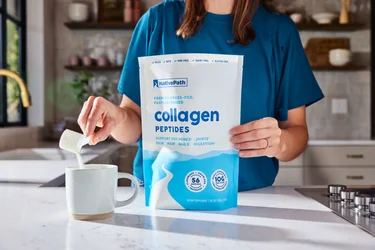Collagen is the most abundant protein in the body. It makes up a significant
portion of your hair, skin, nails, bones, muscles, tendons, and ligaments
(it’s even in your eyes and teeth!). Because it’s a naturally-occurring
protein in the body and in several foods,
collagen supplements
are generally considered safe during pregnancy.
That said, one of the main challenges in determining the safety of collagen
supplements during pregnancy is the limited amount of research available. Many
supplements, including collagen, haven’t undergone extensive clinical trials
specifically involving pregnant women. As a result, healthcare professionals
rely on general principles of supplement safety and the existing body of
scientific knowledge to provide guidance.
Knowing this, always consult a healthcare professional before starting or
continuing collagen supplementation while pregnant. Obstetricians, midwives,
or registered dietitians can provide personalized advice based on your health
status, dietary preferences, and specific pregnancy-related concerns.
Once you get the go-ahead from a medical professional, it’s important to
supplement with the right type of collagen—and the right dose.




